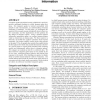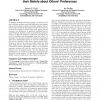283 search results - page 27 / 57 » Modelling socially intelligent virtual humans |
IJCAI
2007
13 years 10 months ago
2007
Human intelligence requires decades of full-time training before it can be reliably utilised in modern economies. In contrast, AI agents must be made reliable but interesting in r...
CHI
2009
ACM
14 years 9 months ago
2009
ACM
In this paper, we describe progress in research designed to explore the effect of the combination of avatars' visual fidelity and users' anticipated future interaction o...
ATAL
2008
Springer
13 years 10 months ago
2008
Springer
Computer agents participate in many collaborative and competitive multiagent domains in which humans make decisions. For computer agents to interact successfully with people in su...
IADIS
2004
13 years 10 months ago
2004
Inductive reasoning is one of the important characteristics of human intelligence. Researchers have regarded inductive reasoning as one of the seven primary mental abilities that ...
ATAL
2008
Springer
13 years 10 months ago
2008
Springer
In strategic multiagent decision making, it is often the case that a strategic reasoner must hold beliefs about other agents and use these beliefs to inform its decision making. T...


